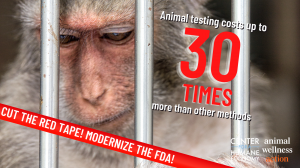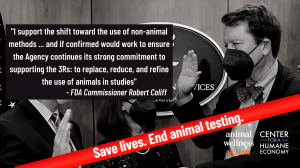Key House Health Subcommittee Hears, Highlights FDA Modernization Act to Eliminate Archaic Animal-Testing Mandates
The Center for Humane Economy, Animal Wellness Action applaud House members for hearing on pro-science, pro-animal proposed regulatory change
FDA operates under an archaic statute when it comes to drug development, requiring animal testing even when there are superior non-animal test methods grounded on human biology.”
WASHINGTON D.C., UNITED STATES, March 17, 2022 /EINPresswire.com/ -- WASHINGTON, D.C. – Today, the Center for a Humane Economy, Animal Wellness Action, the Michelson Center for Public Policy, and other affiliated organizations applauded U.S. Reps. Anna Eshoo, D-Calif., and Brett Guthrie, R-Ky., the Chair and Ranking Member of the House Energy and Commerce Health Subcommittee, for soliciting and hearing testimony on the FDA Modernization Act, H.R. 2565. Reps. Buddy Carter, R-Ga., Tony Cardenas, D-Calif., Kurt Schrader, D-Ore., and other lawmakers worked to advance the measure in committee, drawing attention to the biggest category of animal testing conducted by private companies.— Wayne Pacelle, president, Animal Wellness Action
The legislation, introduced in the House by Reps. Vern Buchanan, R-Fla., Elaine Luria, D-Va., Nancy Mace, R-S.C., Mikie Sherrill, D-N.J., and Brendan Boyle, D-Pa., would allow for regular use of human-relevant nonanimal test methods for drug development. As of March 17th, H.R. 2565 has been cosponsored by 29 House Democrats and 29 House Republicans. A senate companion bill, S. 2952, was introduced by Senators Rand Paul, R-Ky., Cory Booker, D-N.J., Ben Ray Lujan, D-N.M., Mike Braun, R-Ind., and John Kennedy, R-La.
This legislation has garnered a groundswell of support from dozens of biotech and pharmaceutical companies, medical associations, patient advocacy groups, and animal welfare organizations.
“FDA operates under an archaic statute when it comes to drug development, requiring animal testing even when there are superior non-animal test methods grounded on human biology,”said Wayne Pacelle, president of Animal Wellness Action. “This important realm of science and drug development should not be bound any longer by Depression-era strategies.”
“The most predictive technologies in existence should be available to drug sponsors to provide the safest and most effective medicines for patients,” said Gary K. Michelson, M.D., Founder and Co-chair, Michelson Center for Public Policy. “Animal data shouldn’t be the automatic reflex if there are superior non-animal test methods that predict what will happen in human clinical trials.”
“We can apply human biology-based test methods to better predict how humans will respond to drugs in clinical trials,” said Tami Drake, director of research and regulatory policy at the Center for a Humane Economy. “We are already on the verge of the next phase of modern drug development and allowing for the use of only animal models doesn’t reflect 21st-century scientific advancement. H.R. 2565 and S. 2952 will be catalysts for this transition to modern science.”
“I’m also very interested in the FDA Modernization Act. I think that has some great opportunities out there,” said Rep. Kurt Schrader, D-Ore., the only veterinarian in Congress, at the hearing. “I was a veterinarian, any testing that can be done without the use of our 4-footed animal friends, I think is to our advantage and certainly to their advantage. Precision medicine by using tissue cultures and some of the advanced techniques that I think we’re looking at here in the 21st Century is pretty darn exciting.”
“The bill recognizes that scientific methods are advancing every day and will do so for the next set of decades; our national science policy should allow for their use when they are superior. The changes to the Federal Food, Drug and Cosmetics Act called for in the FDA Modernization Act will not limit FDA authority. On the contrary, FDA will now have the authority to work with drug developers to use the best science in the vital realm of drug development,” wrote Rep. Nancy Mace, R-S.C., in a letter to the Subcommittee.
“I have heard from concerned citizens about their opposition to using dogs, primates, and other animals in testing protocols. We should be enthusiastically endorsing the idea of avoiding harm to animals when we can do so. Congress did so when it reauthorized the Toxic Substances Control Act in 2016 for chemical safety testing overseen by the U.S. Environmental Protection Agency.” wrote Rep. Elaine Luria, D-Virg., in a letter to the subcommittee.
“I’d also like to state that I’m pleased to see that legislation to move away from animal testing is being considered, especially as more human-centered alternatives continue to emerge and become more of a standard,” said Rep. Tony Cardenas, D-Calif. in the hearing today. “I’m supportive of many bills that attempt to make this transition and I believe we need to consider a host of measures to achieve this goal. Focusing on more humane approaches when possible is beneficial to both animals and humans.”
The existing drug development paradigm, established by statute in 1938 under the Federal Food, Drug, and Cosmetics Act (FFDCA) relies on animal tests to determine if they are safe and effective for humans has a 95 percent failure rate in human clinical trials. Data show that it typically takes 10 to 15 years and an investment of an average of $1 billion and up to $6 billion for a new drug, slowing delivery of palliatives and cures for patient groups, driving up drug costs, and sacrificing countless animals, including mice, rats, dogs, and non-human primates.
The legislation has been endorsed by dozens of organizations and companies, including the National Medical Association, the National Hispanic Medical Association, Teva Pharmaceuticals, Emulate, Nortis Bio, Beyond Celiac, the United Leukodystrophy Foundation, Myositis Association, People for the Ethical Treatment of Animals, SPCA International, and the Progressive Animal Welfare Society.
Most diseases have no treatment. Modernizing the FFDCA to include 21st-century science, would mean the opportunity to use human-relevant methods to improve the success rate in clinical trials and break the decades-old logjam in bringing life-saving treatments to Americans.
The passage of this legislation will provide drug sponsors more options for testing the safety and efficacy of drugs in order to improve clinical trial attrition rates, cut time to market in half, and substantially reduce R & D costs which could cut drug prices fivefold. It will enable drug sponsors to use the tools of the 21st Century to save the lives of Americans and millions of animals.
Animal Wellness Action is a Washington, D.C.-based 501(c)(4) organization with a mission of helping animals by promoting legal standards forbidding cruelty. We champion causes that alleviate the suffering of companion animals, farm animals, and wildlife. We advocate for policies to stop dogfighting and cockfighting and other forms of malicious cruelty and to confront factory farming and other systemic forms of animal exploitation. To prevent cruelty, we promote enacting good public policies, and we work to enforce those policies. To enact good laws, we must elect good lawmakers, and that’s why we remind voters which candidates care about our issues and which ones don’t. We believe helping animals helps us all.
The Animal Wellness Foundation is a Los Angeles-based private charitable organization with a mission of helping animals by making veterinary care available to everyone with a pet, regardless of economic ability. We organize rescue efforts and medical services for dogs and cats in need and help homeless pets find a loving caregiver. We are advocates for getting veterinarians to the front lines of the animal welfare movement; promoting responsible pet ownership; and vaccinating animals against infectious diseases such as distemper. We also support policies that prevent animal cruelty and that alleviate suffering. We believe helping animals helps us all.
The Center for a Humane Economy is a non-profit organization that focuses on influencing the conduct of corporations to forge a humane economic order. The first organization of its kind in the animal protection movement, the Center encourages businesses to honor their social responsibilities in a culture where consumers, investors, and other key stakeholders abhor cruelty and the degradation of the environment and embrace innovation as a means of eliminating both.
Marty Irby
Animal Wellness Action
+1 202-821-5686
email us here
Visit us on social media:
Facebook
Twitter
Legal Disclaimer:
EIN Presswire provides this news content "as is" without warranty of any kind. We do not accept any responsibility or liability for the accuracy, content, images, videos, licenses, completeness, legality, or reliability of the information contained in this article. If you have any complaints or copyright issues related to this article, kindly contact the author above.


